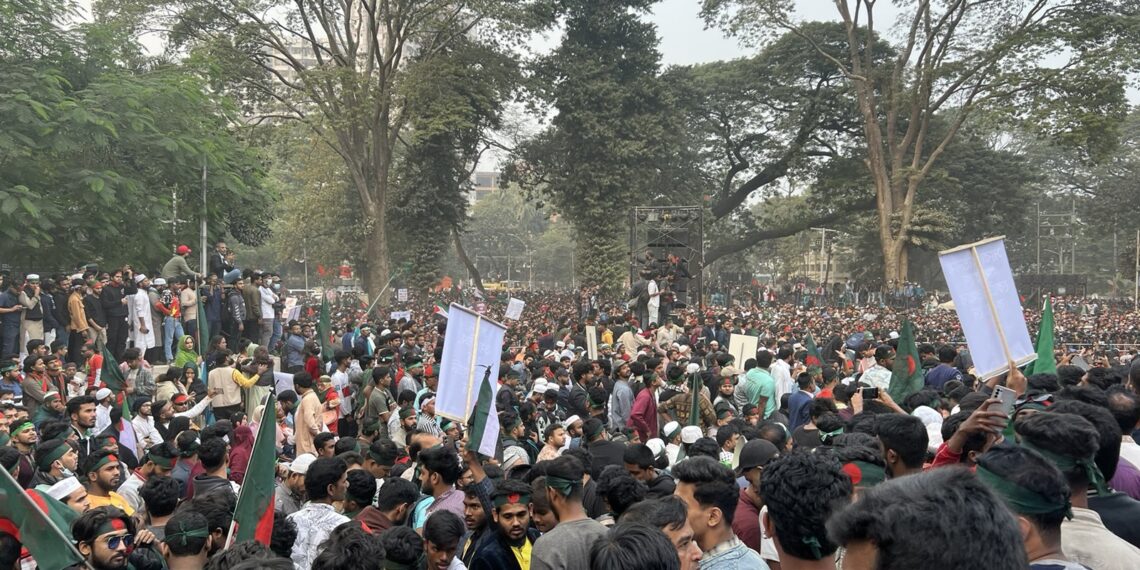In a critical moment for Bangladesh’s political landscape, the Students Against Discrimination (SAD) organised a “March for Unity” at the Central Shaheed Minar in Dhaka on December 31, 2024.
The event, attended by thousands from across the country, was held in support of the interim government’s initiative to draft a declaration of the July uprising based on national consensus.
The gathering aimed to advocate for the rights of marginalised communities while also projecting the Awami League’s 16-year rule as fascist.
During a press conference on December 29 at Rupayan Tower in Dhaka’s Banglamotor area, Hasnat Abdullah, convener of the anti-discrimination student movement, declared that the 1972 “Mujibbadi Constitution”—crafted under the leadership of Sheikh Mujibur Rahman—would be consigned to history on December 31.
“We demand that the Mujibbadi Constitution be declared obsolete. Its grave will be created at the same place where the one-point declaration was announced. We hope that the July revolution declaration will render the Nazi-like Awami League irrelevant in Bangladesh,” Abdullah stated.
SAD, in collaboration with the Jatiya Nagorik Committee (JNC), demanded the issuance of a “Proclamation of the July Revolution” by January 15, 2025.
Akhtar Hossain, JNC’s joint secretary, echoed these calls, emphasizing the public’s desire for reforms and a new constitution.
Notably, the program’s title was abruptly changed from “Counter-Revolution Declaration” to “March for Unity” the night before the event, raising eyebrows.
During the march, calls were made for a new constitution based on Quranic and Sunnah principles.
SAD’s leadership demanded reforms for institutions they claim were destroyed over the past five decades and went as far as threatening to “take matters into their own hands” if these demands were not met.
Simultaneously, the Islami Chhatra Shibir, the student wing of Bangladesh Jamaat-e-Islami, held a public conference at Suhrawardy Udyan in Dhaka, marking its first such gathering in 14 years.
Approximately 6,000 activists attended the event, where Jamaat-e-Islami Ameer Shafiqur Rahman urged members to prepare for a “new battle.”
These developments underscore the resurgence of Islamist groups, including Hefajat-e-Islam and Islamic Andolan, in Bangladesh’s political arena.
The SAD’s focus on Islamic principles, coupled with religious rhetoric, has resonated with the masses but poses significant risks to Bangladesh’s stability.
These dynamics were precipitated by Sheikh Hasina’s forced ouster and exacerbated by Dr. Muhammad Yunus’s alliances with right-wing Islamist groups.
Key figures such as Shafiqur Rahman, Maulana Mamunul Haque of Khilafat Majlis, and Maulana Faizul Karim have become prominent voices in this movement.
The rise of Islamist groups has resulted in growing disrespect for Sheikh Mujibur Rahman’s legacy.
His image has been removed from currency notes, and chapters about him have been excised from textbooks.
Statues and murals commemorating him have been vandalised during protests, reflecting a broader shift away from the secular ideals he championed.
Reports suggest plans to rebrand the country as the “Islamic Republic of Bangladesh” or “Islamic Khilafat Bangladesh.”
A proposed “revolutionary government” would reportedly include figures like Brigadier General Abdullahil Aman Azmi, son of the late Ghulam Azam, as Defense Adviser, and Barrister Najeeb Momen, son of Motiur Rahman Nizami, as Foreign Affairs Adviser.
On victory day, December 15, Dr. Yunus notably omitted mentions of Sheikh Mujibur Rahman, the atrocities committed by the Pakistani army, India’s contribution to Bangladesh’s independence, and the surrender of 93,000 Pakistani soldiers.
Such omissions fuel fears that the interim government is pandering to extremist elements.
The interim government’s inaction on religious extremism, combined with a passive military and shrinking space for minorities, raises concerns that Bangladesh may be on a trajectory similar to Pakistan.
The demand for an Islamic state, coupled with the dismantling of secular governance, threatens the nation’s stability and undermines its founding principles.
If unaddressed, this intersection of political chaos and radical Islam could lead to long-lasting consequences for Bangladesh’s identity as a progressive and inclusive nation.















